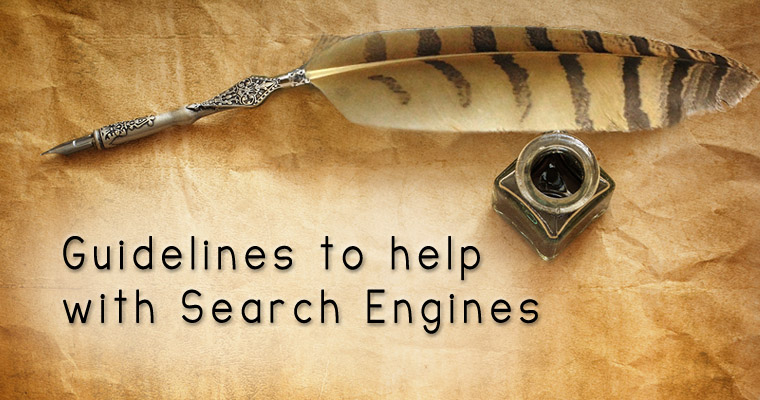Guidelines to help with Search Engines

Guidelines for Your Site
Be sincere. Sites which engage in user abuse such as Cloaking, Link Schemes, Redirects, Keyword Stuffing, or Misleading markup are considered to be low quality by all search engines. As a result, these sites can incur ranking penalties, have markup ignored, or not be selected for the index. The guidelines mentioned above are the most widespread forms of inappropriate, manipulative or misleading behaviors; there are others. Google, Microsoft (Bing), and other search engines company may take action against you or your site for any other deceptive practice not described here. In addition, users can report abuses, so skip the sneaky and stick to sincerely. It is just good business.
I strongly encourage you to pay very close attention to the Quality Guidelines discussed below. They outline some of the illicit practices that may lead to a site being removed entirely from any search engines’ index or otherwise affected by an algorithmic or manual spam action.
Quality guidelines
SEO managers and webmasters who spend their energies upholding the spirit of the basic internet (website) principles will provide a much better user experience and subsequently enjoy better ranking than those who spend their time looking for loopholes in search engine rules they can exploit.
Search engines prefer developing scalable and automated solutions to problems. They attempt to minimize spam conflicts. Tho they may not take manual action in response to every report, spam reports are prioritized based on user impact, and in some cases may lead to complete removal of a spam-filled site.
Basic principles for any website
- Make pages primarily for users, not for search engines.
- Think about what makes your website unique, valuable, or engaging. Make your website stand out from others in your field.
- Avoid tricks intended to improve search engine rankings. A good rule of thumb is whether you’d feel comfortable explaining what you’ve done to a website that competes with you, or to a search engine employee. Another useful test is to ask, “Does this help my users? Would I do this if search engines didn’t exist?”
- Don’t deceive your users.
Help Search Engines find your pages
- Ensure that all pages on the site can be reached by a link from another findable page. The referring link should include either text or, for images, an alt attribute, that is relevant to the target page.
- Provide a sitemap file with links that point to the important pages on your site. Also, provide a page with a human-readable list of links to these pages (sometimes called a site index or site map page).
- Limit the number of links on a page to a reasonable number (a few thousand at most).
- Make sure that your web server correctly supports the
If-Modified-SinceHTTP header. This feature directs your web server to tell search engines if your content has changed since we last crawled your site. Supporting this feature saves you bandwidth and overhead. - Use the robots.txt file on your web server to manage your crawling budget by preventing crawling of infinite spaces such as search result pages. Keep your robots.txt file up to date.
Ways to help Google find your site:
- Submit it to Google at http://www.google.com/submityourcontent/.
- Submit a Sitemap using Google Search Console. Google uses your Sitemap to learn about the structure of your site and to increase our coverage of your web pages.
- Make sure that any sites that should know about your pages are aware your site is online.
Ways to help Bing find your site:
- Submission through the Submit your Site to Bing web form: this method is designed to allow web publishers to quickly alert Bing that their new site exists. Bing will crawl the URL you submitted and — provided it meets certain criteria — will index the page.
- The Submit URLs feature in the Configure My Site section in Bing Webmaster Tools: this feature is much faster and allows you to submit 10 URLs per day and a maximum of 50 URLs per month for immediate crawl and indexation.
Ways to help Yahoo find your site:
- Go to the following link: http://search.yahoo.com/info/submit.html
- Click on “Submit Your Site for Free”
- You will be redirected to Bing. Follow on-screen instructions for submitting your URL.

Quality Rating Guidelines
Useful and informative should always be present. You can include the location, hours of operation, contact information, product and/or services and a blog to share upcoming events. This is usually on your contact page, but it is nice to have it on other parts of your site – where appropriate.
Grammer and readability are sometimes forgotten. Pages and posts that are organized and easy to read will result in more returning visitors and a higher conversion rate. Think about clear paragraphs, short sentences, limit difficult words, use transition words, and mix up the lengths of paragraphs and sentences. Yes, short sentences. Make sure visitors are not distracted by spelling, stylistic and factual errors.
High-quality content will make the user want to come back to your site and possibly generate income on a website. Your site’s content should be unique, specific and high-quality. It should not be mass-produced or found on a large number of other sites. Content should be created primarily to give visitors a good user experience, not to rank well in search engines. Plus, high-quality content does rank well on search engines.
Be Credible. Show your site’s credibility by using original research, citations, links, reviews and testimonials. There is a book called “Persuasive Technology” by Ph.D. B.J. Fogg (2003) it talks about “knowledgeable, experienced, [and] competent.” Expert sites include:
- Links to/from other Web sites show the site is well-respected
- Credentials of the author(s) are valued
- Articles contain citations and references
Credibility is a found in the trustworthiness. Websites should be well-intentioned, truthful, and unbiased. This can be done if pages:
- Provide a useful set of frequently asked questions (FAQ) and answers
- Provide links to outside sources and materials
- Ensure the site is frequently linked to by other credible sites
Engaging webpages bring color and life to a website by adding images of your products, your people or team, or even yourself. A website can also communicate with visitors through your visual design.Believe it or not, your design says a lot about you and your company. The colors you use, the level of creativity, the overall look and feel of your site—everything communicates who you are, what your values are, and whether or not you are likable people. Engage visitors by interacting with them through regular updates, comment boxes or social media widgets.
Be human. The voice plays an important part when it comes to establishing two-way communication on any website. The trick is to balance between professionalism and still being within reach.
As discussed above, people are looking for expert and trustworthy information. Provide that, but make sure you don’t sound arrogant. Again, get others to confirm your expertise for you. References and testimonials are a great way to gain authenticity without bragging about yourself or your company.
Keep your target audience in mind and beware of their language. They are the people you want to connect with and, as such, it is critical that you speak their language. If you are not sure how they talk, find out – their jargon and the topics they are interested in.
Quality Site Check List
There are obstacles that are outside of your control in the short term, but you can enter the long game and continue to build your authority over time by consistently creating comprehensive content. Here is checklist of guidelines
- Broken links. Crawl your site with a program like Screaming Frog and fix them.
- Wrong information. Do research and find the right sources.
- Grammatical mistakes. You can use a tool like Grammarly (my favorite) or have someone proofread your writing.
- Spelling mistakes. Use spell-check or an editor.

- Reading level. The Hemingway App is good for this. If your site is a WordPress use Yoast. You should beadjusting your reading level based on your target audience and the intent of the query.
- Excessive ads. Never a good idea if you are selling content.
- Page load speed. Go read this.
- Website features. The features you should have will change depending on the type of website and the intent of the query.
- Matching the user intent with the purpose of a page and type of content expected. Take a look at the search results to see what is already ranking.
- Authority and comprehensiveness. Keep reading.
Don’t Do Guidelines
Avoid the following techniques:
- Automatically generated content
- Participating in link schemes
- Creating pages with little or no original content
- Cloaking
- Sneaky redirects
- Hidden text or links
- Doorway pages
- Scraped content
- Participating in affiliate programs without adding sufficient value
- Loading pages with irrelevant keywords
- Creating pages with malicious behavior, such as phishing or installing viruses, trojans, or other badware
- Abusing rich snippets markup
- Sending automated queries to Google
Extra techniques to stop hackers:
- Monitoring your site for hacking and removing hacked content as soon as it appears
- Preventing and removing user-generated spam on your site
Practical Insights for your Website
Conforming to these guidelines is an easy way to meet the expectations of your visitor, and audience. The web has been around a while now. Visitor and audiences are smart. They come with strong ideas about what they’ll find and where they’ll find it. If you break any of these rules, you should do so intentionally and with a very good reason, because the results may not be what you intended.
Hello ,
I saw your tweets and thought I will check your website. Have to say it looks very good!
I’m also interested in this topic and have recently started my journey as young entrepreneur.
I’m also looking for the ways on how to promote my website. I have tried AdSense and Facebok Ads, however it is getting very expensive.
Can you recommend something what works best for you?
I also want to improve SEO of my website. Would appreciate, if you can have a quick look at my website and give me an advice what I should improve.
(Recently I have added a new page about FutureNet and the way how users can make money on this social networking portal.)
I wanted to subscribe to your newsletter, but I couldn’t find it. Do you have it?
Hope to hear from you soon.
P.S.
Maybe I will add link to your website on my website and you will add link to my website on your website? It will improve SEO of our websites, right? What do you think?
Regards
Jan Zac
Hi Jan,
Looks like you have everything in order. Did you add Yoast?
Sincerely,
Christopher